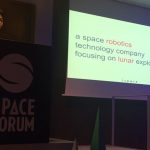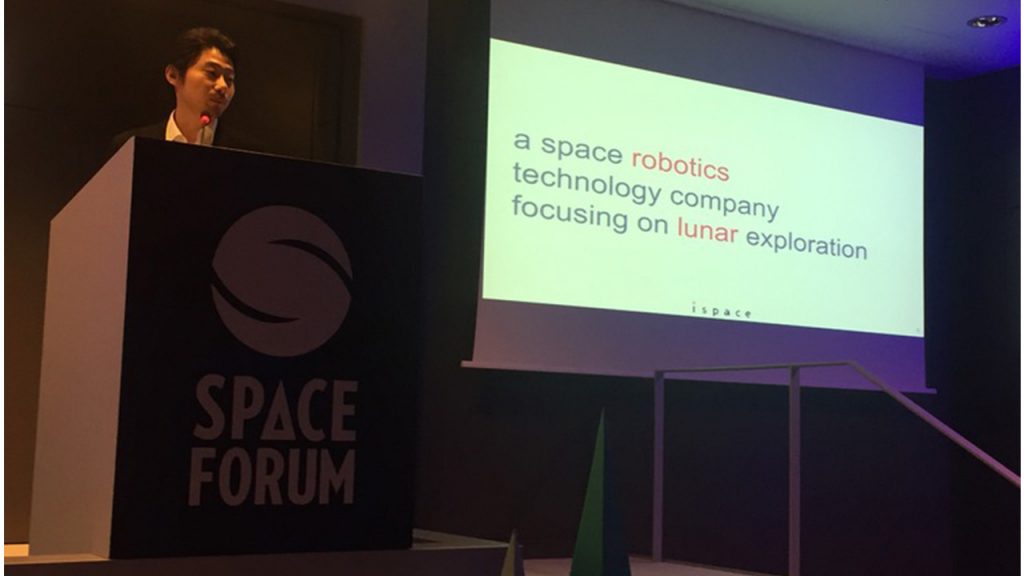Takeshi Hakamada’s personal vision has been to create a world where spaceships like the ones in Star Wars that fly between planets. At university he heard of the Ansari XPRIZE (commercial human spaceflight) from a pilot of Spaceship One and felt a dawn of a new commercial space industry. He chose the path of consulting after university, realising that commercialisation requires not only engineers but also a management team and investors.
In 2013 he took over as the team lead for the project HAKUTO competing for the Google Lunar XPRIZE and concurrently founded ispace technologies. Since then he has led Team HAKUTO and ispace in winning a $500,000 milestone prize, raising $2M in venture capital and generating nearly $6M in advertising revenue.
The main focus of ispace is to locate, extract, and deliver lunar ice to customers in cis-lunar space. ispace specialises in using 3D printed and commercially off the shelf products (COTS) for rapid prototyping while maximising structural mass efficiency and shortening the developmental life cycle. Its micro-robots will be able to explore larger areas of the Moon faster and at a fraction of the cost of large robots, ensuring a more cost effective approach to lunar exploration in the future.
Takeshi participated in the Exploration & Space Mining stream at the Space Forum in Luxembourg, after which he spoke Spaceoneers about how his team will now send small-sized rovers to the Moon.
Spaceoneers: Describe your value proposition and what ispace does.
Takeshi Hakamada: ispace is focused on space robotics and we are currently developing very small-sized rovers, which will operate on the Moon. Usually in the space industry they have developed a huge robot for Mars or the Moon. However cost is the most critical part in doing business, alongside the cost associated with a launcher. So we try to reduce the mass of our rover as much as possible – our smallest model is 4kg.
Even though we are developing very small rovers, this rover is also able to host several small instruments like a Newton spectrometer or other scientific instruments. We are going to provide mobility capabilities to explore on the Moon for the space agencies or commercial companies who want to build a base on the Moon.
Spaceoneers: You were also talking [at Space Forum] about mining water ice on the Moon?
Takeshi Hakamada: Yes, our long-term vision is to mine water ice on the Moon, therefore providing fuel to spacecraft or a rocket. This is going to take ten years, maybe fifteen years to create such a business. In the short- or medium-term we are expecting a payload business. We are going to develop our business here step-by-step to become a space-mining business.
Spaceoneers: How did you come up with the idea for your business?
Takeshi Hakamada: I personally studied aerospace engineering in Japan and the United States, and then I was really inspired by the Ansari XPRIZE, a competition for commercial spaceflight. At that moment I realised that technology is important but also finance and management is more important if you want to do it in a commercial way. After my graduation I worked in the management consulting industry to being familiar with management and fundraising. Then I was looking for a project, in which I was able to able to involve myself. I met with Prof. Yoshida at Tohoku University; he has technology and he was looking for a person who could deal with management and fundraising of a company. I decided to team up together with him to compete for the Google Lunar XPRIZE.
Spaceoneers: How did you come up with the name of your business?
Takeshi Hakamada: It is sometimes misunderstood with names such as iPod. We don’t take our name from such things. The ‘i’ means “innovation”, “individual” and “inspire”. We want to make space to become more personal, making it feel closer for human beings. My personal vision is to create a world where we live in space. From such a vision we came up with the name ispace.
Spaceoneers: Do you do education about space through ispace in Japan?
Takeshi Hakamada: We sometimes have classes with children to explain about our project and how space inspires people. We like to share our vision for a future world. We also think it is very important because they are the next generation who are going to go to space.
Spaceoneers: Who and what were your influences towards becoming an entrepreneur?
Takeshi Hakamada: Well, I haven’t so much looked up to model people. However, Peter Diamandis is such a person who has influenced me through the XPRIZE.
Spaceoneers: What were the biggest challenges to starting your business?
Takeshi Hakamada: Technology is important, however to do something money is critical. In order to get the money, it is a chicken and egg scenario, always. We were trying to do something without any money. We succeeded to fundraise two years ago but for three years we worked on this project voluntarily. We never gave up this project even though we were not funded.
Spaceoneers: How did you stay motivated to overcome these challenges?
Takeshi Hakamada: I love Star Wars. I want to see a world where spaceships are cruising from planet to planet. In order to achieve such a world, space mining is a most critical step. I always continue to think about these things. I’d say that’s my motivation.
Spaceoneers: How did you get funding?
Takeshi Hakamada: We fortunately met with Japanese angel investors. We shared our visions with them and they agreed to put some initial money forward. After that we set up a sponsorship programme and got several million dollars from this.
Spaceoneers: How did you convince your investors to get behind your ideas?
Takeshi Hakamada: In the stage of the angel investment, I think the most important factor was the founders. They recognised me as a person who is really motivated and that could grow a business.
Spaceoneers: How did you get your sponsors on board?
Takeshi Hakamada: In order to approach sponsors, I think introductions are very important. This kind of sponsorship programme cannot be sold just to the low managers’ level. We need to reach the highest people like a CEO. I got several introductions to the key people.
Spaceoneers: How did you get a team together to develop a product?
Takeshi Hakamada: Prof. Yoshida was a key person. At his laboratory he has a lot of talented students. We partnered with the university to do some basic research of our rover system. Several students were interested in working with the project. After they got their PhD, ispace hired them. We have currently 7 talented engineers, not only from Tohoku University but outside.
Spaceoneers: Which technologies and trends do you think will drive the biggest industry in the next years?
Takeshi Hakamada: First is miniaturisation. Larger, heavier hardware is difficult to launch in terms of cost. Miniaturised hardware is therefore very critical with COTS (commercial off-the-shelf) components. Second is the software that will enable much more complex systems. Once you launch, you cannot go there and fix a problem. Software is therefore also very critical to modify the system after launch.
Spaceoneers: Do you focus just on hardware or do you work on both?
Takeshi Hakamada: We work on both hardware and software right now. In the future we may outsource some of this. A system is a combination of the hardware and the software, they dependent on each other.
Spaceoneers: How will these trends affect your contribution to the industry?
Takeshi Hakamada: Our contribution to the global industry is getting the Japanese on board with this very exciting industry. Japan has very good technology and talented people, so I want to get Japanese on board to the new space industry.
Spaceoneers: What important advice would you give to those starting their own space startup?
Takeshi Hakamada: Never give up! I’d say that is the most critical message. You have to have determination to never give up. You also have to follow what is going on around you as everything can go by very fast. You will have to make difficult decisions. But most importantly, don’t forget your vision!
Spaceoneers: What makes you a spaceoneer?
Takeshi Hakamada: We are taking a risk. I think that because we are taking a risk we may become the first people to achieve our vision.

